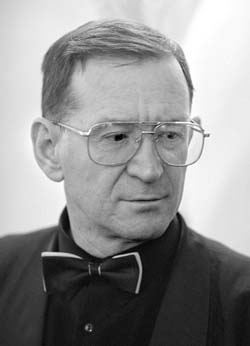“A number of our contemporaries have turned into bad Western composers”
Ukrainian National Philharmonic hosts concert by Kyiv Camerata
This time around the increasingly popular Kyiv Camerata group offered “Orchestral Transcriptions of Ukrainian Composers,” performing works by Karabyts, Kiva, Sylvestrov, Stankovych, Zubytsky, and Skoryk. The evening was a true musical feast for music lovers. The musicians gave a subtle interpretation of works by Ukraine’s distinguished contemporary musicians.
HOW TO BECOME A CONDUCTOR
“I took up conducting after I turned 40,” admitted Valeriy Matyukhin. “Actually, as the founder of Kyiv Camerata and its artistic director since 1977, when it was a chamber ensemble of the composers’ union, I was able to step up to the conductor’s stand the very first day, but at the time I was more interested in solo and chamber performance. The turning point came in 1992, when Volodymyr Sirenko — we were working together — finally joined the National Symphony Orchestra of Ukraine, leaving the Camerata without a conductor. That was how I ended up at the conductor’s stand.”
You became a conductor without a professional education?
V.M.: Conductors are taught something at the conservatory, of course, but the lack of practical knowledge often turns their habits upside down. Working in Camerata, I knew all there was to know about contemporary music, and from the beginning I never had any problems reading scores. I’ve never made any marks on scores, as some of my colleagues do. That’s probably why many cannot master contemporary music; they fill pages of scores with metric notations for fear of doing something wrong. Even so, their music doesn’t move in the right direction. That’s also why I was never eager to work with a big symphony orchestra. A chamber group offers more opportunities to peer into the nooks and crannies of a musical score.
Igor Stravinsky once said that an orchestra felt more or less confident performing his Rite of Spring only after 16 rehearsals.
V.M.: Of course, every conductor would like to devote more time to a certain symphony orchestra. But our opportunities are limited, and musicians often have a flippant attitude to practicing and learning their parts. I recall quite a few ‘minor tragedies’ when, for various reasons, musicians wrecked a piece of music or at best put on a mediocre performance. I always tell the orchestra that the composer and the audience won’t ask how long it took you to rehearse. They will see the end result. Our group has performed contemporary music for almost 30 years as part of private theatrical concerns and as a national ensemble since 1993. We practically shouldered the entire burden of the Kyiv Music Fest. Every year we played seven concert programs during the festival and nine in 1996. This was very important and the musicians acquired priceless acoustic experience. Now they can play any composition practically without rehearsing.
One of the distinctive features of your ensemble is its subtle interpretations of compositions.
V.M.: I think it would be improper here to discuss any virtues or shortcomings. To an extent the image of any performing group is determined by the conductor. The repertoire policy is his prerogative. There are times when I don’t like this, but when in Rome, you must do as the Romans do. Honestly, I wish government-supported chamber orchestras paid more attention to Ukrainian music. For me this is not politics, it’s my being. Even associating with composers is a special part of my world perception. I think that others regard this as a duty that they aren’t trying hard to honor, performing the same works all the time. This is something that should worry not me but the Ministry of Culture and Tourism. I could easily carry out my concert plans without playing contemporary music. But I can’t live without it, that’s my troublemaking character talking. Even commemorative dates could be used to stage many composers’ concerts; last year there were concerts to commemorate Zagortsev, Tsepkolenk, and Zhanna Kolodub. Our group was the only one in Kyiv to mark the 70th anniversary of the Estonian genius Arvo Part. Right now we’re preparing a concert dedicated to Gia Kancheli’s jubilee. We’ve launched a series called “Music of the Third Millennium,” based on our idea; even now we can put together six or seven programs of compositions that were written in the past five years.
MUSIC OF THE THIRD MILLENNIUM
Do you think Ukrainian music has acquired a new quality in the third millennium?
V.M.: It has always been on a very high level in the persons of its finest representatives, and it will remain so. No one can accuse me of nationalism. I am Russian and I live in Ukraine. Even in Soviet times we founded the concert series “Music of the Fraternal Republics,” which gave us the opportunity to familiarize ourselves with the cultures of the Baltic republics, the Caucasus, and Central Asia, and to invite composers and stage festivals of national cultures. Even then Ukrainian music was marked by a special spirituality against the background of Lithuanian and Latvian music that was unquestionably interesting, as well as original works by Georgian and Armenian composers. Paradoxically, the music from Moscow was absolutely uninteresting even though it was technologically flawless, of course, with several textbook exceptions.
I can’t explain why, but the 1990s saw a process of retreat to a self-centered fascination with technology. A great many of our contemporaries suddenly turned into bad Western composers. In his time Stravinsky changed styles easily, showing that he could do this and that, and something else equally well, but he always remained Stravinsky. Today some of my colleagues are totally devoted to fashionable foreign music. But just as in the past there was no music here, and there still isn’t.






